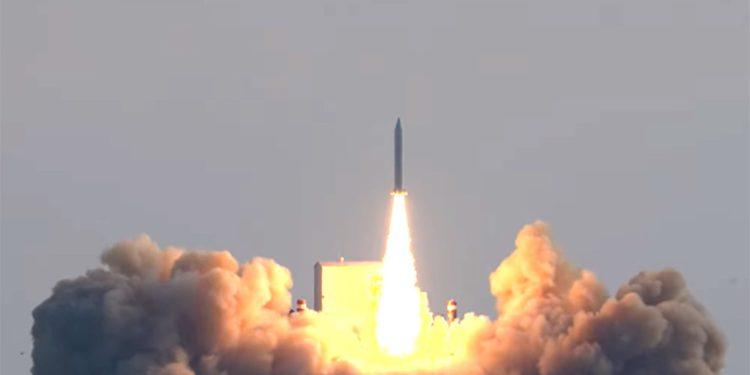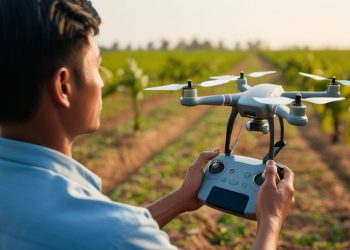Hanwha Systems has successfully launched South Korea’s inaugural privately-owned commercial Earth observation satellite. The “Small Synthetic Aperture Radar (SAR) Satellite,” developed and manufactured entirely with Korean technology, lifted off from the waters south of Jeju Island at 2:00 p.m. on December 4.
The launch follows South Korea’s third trial flight of a domestically developed solid-fuel space rocket carrying a satellite. It comes after two prior test launches conducted in March and December 2022. The Ministry of National Defense highlighted the collaboration between the Agency for Defense Development and a private company, emphasizing the successful application of solid-fuel launch vehicles and orbital entry technology in creating a commercial satellite launch vehicle.
The launch from a floating barge is due to South Korea’s lack of a land-based launch pad for solid-fuel rockets. The synthetic aperture radar satellite was designed by Hanwha Systems for Earth observation.
The rocket’s trajectory sparked intrigue during its second test launch in December last year, leading to UFO rumors. This launch, however, carried a fully operational satellite into orbit at approximately 650 km, representing the first solid-fuel rocket to transport an actual satellite. The satellite, weighing 100 kilograms, sent its inaugural signal to a ground station at 3:45 p.m., successfully initiating two-way communication.
Developed through a collaboration of governmental technical support and the capabilities of private companies, the launch vehicle, based on solid technology previously established by the government,
Hanwha Systems is anticipating the initial communication between the satellite and the ground station at the Yongin Research Center’s satellite control center. The company plans to leverage the Small SAR Satellite for environmental monitoring, high-resolution satellite image analysis, GIS mapping, and automatic fusion and analysis of satellite image information as it promises various added values for business and government applications.
The ministry emphasized the superiority of solid-fuel rockets in terms of simplicity, ease of storage and transport, cost-effectiveness, and quick launch preparation, making them ideal for low-orbit observation and reconnaissance satellites.
Hanwha Systems’ Small SAR satellite withdraws from conventional satellite design, integrating its payload, main body, and solar panels for enhanced efficiency and cost reduction in launch operations. Integrating a multitude of electronics into a singular structure streamlines the launch process and aligns with Hanwha Systems’ strategic expansion.
Lee Sung-Cheol, the CEO of Hanwha Systems, envisions the company broadening its business scope to encompass developing, manufacturing, launching, controlling, and servicing privately owned satellites.
While the versatility of solid-fuel rockets extends to the potential for equipping warheads, the South Korean military is determined to utilize them exclusively for space exploration purposes.
The Ministry of National Defense is on track to send five reconnaissance satellites into space by 2025 to increase the solid-fuel rocket’s payload capacity to 1,500 kg. This development raises the possibility of an evolving inter-Korean space race, as North Korea, too, is advancing its solid-fuel propellant capabilities for potential use in ballistic missiles.
Read More:
- Hanwha Aerospace Signes a Supply Contract Worth KRW 235.6 Billion with Vertical Aerospace, a British UAM Developer
- Hanwha Group Dives into Robotics Industry with Hanwha Robotics Co. Launch
- South Korea’s First Commercial-grade Satellite Nuri Rocket Lifts Off
- Hanwha Systems Ventures into Satellite Internet Sector, Focuses on Military and Commercial Applications
- South Korea’s First Commercial-grade Satellite Nuri Rocket Lifts Off







